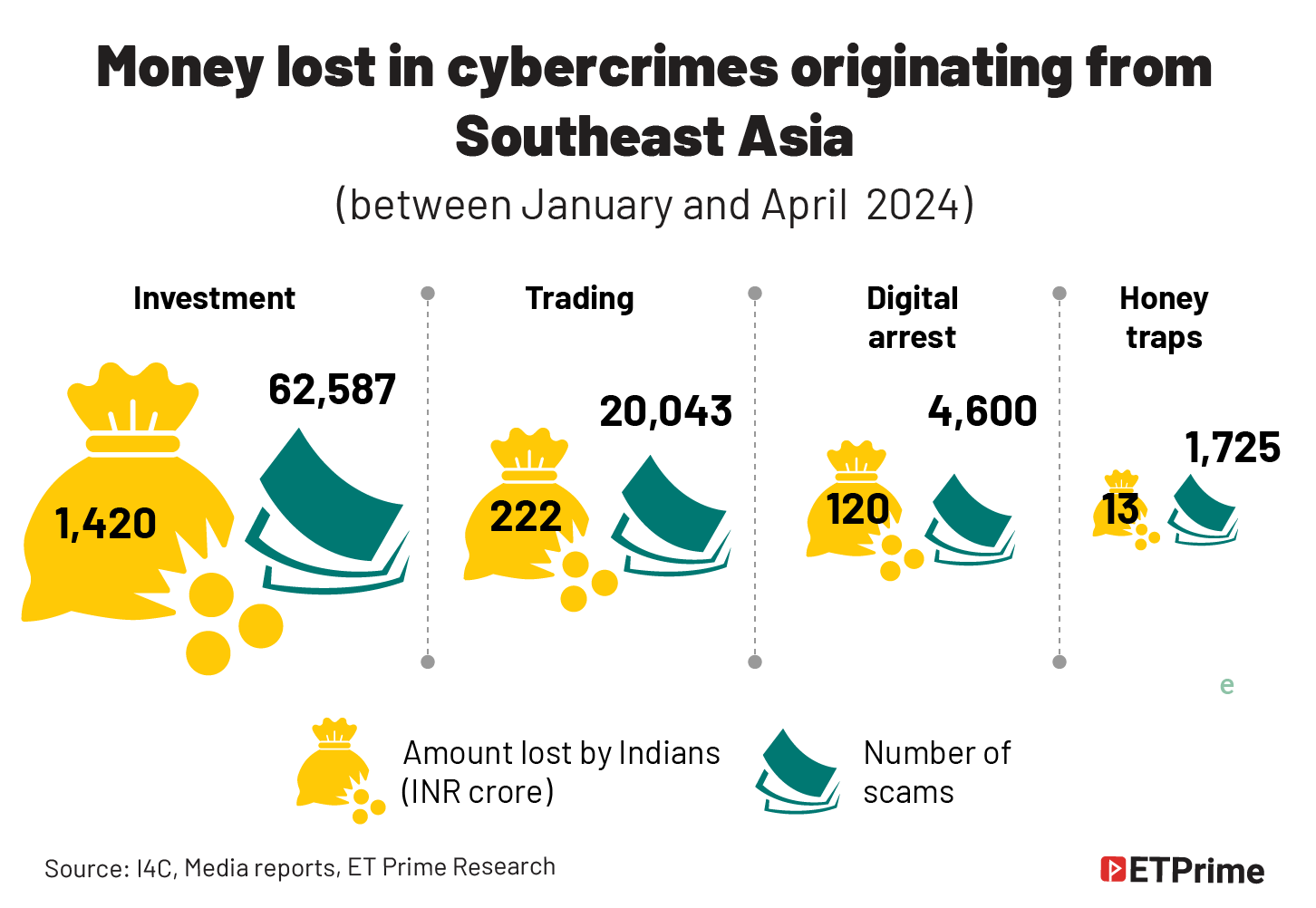Approximately USD900, free meals, and a lodging for a data entry job in Vietnam. This was one alternative staring at Dinabhandu Sahu. The other one was a debt of INR3.5 lakh and temporary jobs in Odisha.
Sahu picked Vietnam.
But things took a different turn once he reached there. Sahu was forced by the company which had advertised the job to go to Cambodia. There, he was made to create fake profiles – hundreds of them – to get people to invest in cryptocurrency scams. Sahu, who returned to India recently, shared his story with multiple media outlets.
As you read this, there are about 5,000 Indians stuck in Cambodia after they were lured by the promise of higher salaries, free meals, and accommodation, but were made to defraud fellow Indians just to get the meals. The reports have estimated this amount to be about INR500 crore.
Till May 20, over 360 Indians have been rescued from the region. The police have also been cracking down on Indian agents who are supplying people to work as cyber-slaves in other countries.
The scale of operations, which had come to light in the last couple of months, and what the people were made to do when they were moved to Cambodia, has been staggering.
Why did Indians accept the job in Cambodia?
They did not, mostly.
Many Indians who were rescued from Cambodia were recruited by unregistered agents in the country and were promised jobs in places like Singapore and Vietnam as data entry operators.
According to multiple media reports, based on interaction with victims, most of the victims are educated but unemployed. They were looking for better jobs and were inclined to move overseas. Most of them found these openings through social media posts, WhatsApp, or other messaging channels. The job descriptions appeared innocuous: data entry, digital sales and marketing executive, and customer service representative.
Ravi Shankar Ayyanar, commissioner of police, Visakhapatnam told the media that based on the initial conversations with those rescued, the victims had paid INR1.5 lakh to get the job abroad.
How did they reach Cambodia?
The Ministry of External Affairs (MEA) said in a statement that the victims are made to go through a simple interview process and then a typing test. Once they cleared the test, jobs with high salaries, along with accommodation and air tickets, were offered.
According to multiple media reports quoting victims, they were first given tourist visa to Thailand or Vietnam, and from there they are taken to Cambodia or Laos illegally.
A report by The Print said that after reaching Bangkok, victims are then taken to Cambodia border by car, where they were given two-month work permit. In the case of victims going to Laos, the MEA statement said that they are taken to the region illegally from Thailand and are made to work in the Golden Triangle Special Economic Zone in the region.
What happened there?
They are made to carry out online scams, especially targeting the Indian population.
Ayyanar, the police commissioner who was cited earlier, told the media that many of the people were taken to special economic zones in Thailand-Cambodia border, and were given intense training of 10 weeks. According to him, these include parcel scams, investment frauds, and romance traps.
Let us take Sahu, for instance. According to online media platform Scroll, he and others were forced to create fake profiles to get people to invest in cryptocurrency scams. He had a target of INR1 lakh worth of investments. Hundreds of Indians like Sahu were forced to defraud Indian customers, since failure to comply could mean they will be beaten or starved.
Based on Ayyanar’s comment to media platforms, many Indians who failed to deliver for days in a row were starved or given only one meal per day. Those meeting targets were able to receive daily meal.
What is the consequence?
Over the last few months, there has been a rise un cybercrimes targeting Indians through variety of scams like the parcel scam, investment and trading scams, and romance traps.
A source, who did not want to be named, said that the Indians who were lured were made to work on some of these. It is estimated that close to INR500 crore were stolen through them.
According to an analysis by Indian Cybercrime Coordination Centre (I4C), set up by the Ministry of Home Affairs, about 7,000 cyber-related frauds have been registered with the National Cybercrime Reporting Portal daily, and 45% of them have their origins in Southeast Asia running into crores.

How is government tackling this?
Like mentioned earlier, so far 360 people have been rescued. But there are still thousands working under harsh conditions.
Recently, the MEA issued an advisory to Indians travelling to Cambodia and Laos for work. The Ministry of Home Affairs and MEA are also working with the Cambodian government and authorities to rescue the rest of them.
The Centre set up an interministerial committee of law enforcement agencies and intelligence agencies on May 16 to handle the rise in cybercrimes targeting Indian from the Southeast Asian countries, as shared by I4C chief executive Rajesh Kumar in a recent press conference in New Delhi.
He had also shared that I4C is actively monitoring and blocking platforms and accounts used for cybercrime like the Skype accounts and advertisements on platforms like Meta and Google, SIM cards, and bank accounts.
(Graphic by Sadhana Saxena)
No comments:
Post a Comment